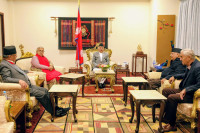Opinion
Not in our name
A Truth Commission cannot impose reconciliation upon victims of conflict under any circumstance
Suman Adhikari
A Recommendation Committee is currently working to recommend commissioners for the Truth and Reconciliation Commission (TRC) and the Commission for the Investigation of Enforced Disappearances (CED), which are supposed to begin work by December 10. The Recommendation Committee was technically completed after the National Human Rights Commission (NHRC) sent a representative. The same NHRC had previously ignored calls from the Recommendation Committee to send a representative, arguing that the government had not incorporated recommendations from the Supreme Court to the TRC and CED Act. Then, the NHRC put forth three conditions to the Recommendation Committee before sending a member: amendment of Sections 25(1) and 25(4) of the Act; formation of victim-centric Commissions; and no amnesty for serious human rights violations. So unless the NHRC has a clear strategy on the matter now, there will be nothing left to be done once the commissioners are recommended.
Against everyone’s wishes
In May, the Parliament endorsed an amnesty-oriented TRC and CED Act, ignoring the mandamus of the Supreme Court, recommendations from an expert taskforce, and commitments made by the political parties during election time. The Act is silent on disappearances, gives no clear mandate to the CED and does not envision coordination between the Commissions. The Commiss-ions’ dependence on the government for staff and resources further erodes their efficiency and independence. The discretionary power accorded to the Commissions to recommend amnesty, even for serious crimes, has superseded the voluntary consent of victims. The Act has also limited the Attorney General’s power to prosecute under government control. Additionally, the Act has not ensured trustworthy witness protection mechanisms and neither has it ensured reparations as victims’ rights. It does not criminalise enforced disappearance and torture either.
Countrywide consultations with conflict victims have concluded that the TRC Act cannot ensure truth, justice, reparation, and accountability. Hence, victims registered a writ at the Supreme Court, challenging Sections 13(2), 22(1), 24, 25(2), 25(4), 26(2), 26(5) and 29(1) of the Act—all of which do not comply with the Interim Constitution, the Supreme Court orders on transitional justice, universal human rights laws, and principles of transitional justice. A number of writs on gender issues and the constitutionality of the Recommendation Committee are also sub judice at the apex court. Human rights activists and civil society have declared their non-cooperation with Commissions that do not comply with the Supreme Court mandamus and state obligations to human rights laws. An expert committee formed by the Nepal Bar Association (NBA) also concluded that the Act is amnesty oriented. In a technical note, UN OHCHR stated that the Act is inconsistent with Nepal´s international legal obligations and UN policy, and urged the government to amend the Act. Special rapporteurs and international human rights organisations like Amnesty International, the International Commission of Jurists, and Human Rights Watch, have all urged the Nepal government to amend the Act in line with UN technical note.
Rubber stamp
The Recommendation Committee had already prepared a selection procedure without holding any consultations with concerned stakeholders even before the NHRC joined the team. The selection procedure does not include a provision to lodge complaints against candidates and the Committee has the right to recommend any person as commissioners to the TRC and CED based on their conscience. The Committee also held separate consultations with rebel and state victims after asking for applications. Currently, the Recommendation Committee has not short-listed the applicants, but it has not concluded any of its applicants to be ineligible either. Persons outside of the application process are rumoured to be engaged in negotiations to become future commissioners. This reveals that the Recommendation Committee is just a rubber stamp and is certain to recommend commissioners under political influence.
The political parties involved in the 10-year armed conflict are currently in power and the Maoist combatants who fought against the state have already been integrated into the Nepal Army. The TRC and CED are major components of the peace process, which seek to heal the pain and injustice suffered by conflict victims, restore their ruined lives, and rebuild social trust and broken relations. So the objectives of the TRC and CED are to ensure truth, justice, reparations, and public acknowledgement of victims while also preventing future abuse, and combating pervasive impunity. The Commissions also seek to identify serious human rights violators and hold them accountable, initiate security sector reform, and promote individual and national reconciliation. So in principle, transitional justice processes and truth commissions are supposed to be victim-centric.
Yet, in Nepal, there are only superficial discussions that argue that victims have waited for too long. Therefore, any kind of Act will need to be accepted to expedite the process to form Commissions. Undoubtedly, conflict victims want the immediate formation of these Commissions and seek to be healed from the trauma of victimisation. But that does not mean that they are willing to accept cosmetic commissions that will only double their unrest and will not address the causes and effects of conflict.
The government and political parties have defied serious demands to amend the Act. This raises serious questions about the Commissions that are about to be formed. How can the Commissions function in isolation, despite serious objections from concerned stakeholders? Can the Act heal the pain of conflict, end the culture of impunity, and initiate a rule of law and good governance? Do we really want grassroots causes and effects of conflict to be addressed or do we simply want to make halfhearted efforts by turning the Commissions into employers of party representatives?
True justice
The Truth Commission can be a facilitator, but it cannot impose reconciliation upon victims of conflict under any circumstance. Still, the government and political parties are in the process of forming a commission along the lines of reconciliation. Such imposition of forceful reconciliation will not heal the pain of victims. Rather, the consultation, ownership, and participation of conflict victims are a must for the successful completion of transition justice. Commissions must be trustworthy, capable, and include expertise on transitional justice.
The NHRC, NBA, human rights activists, civil society, and victims groups, therefore, must collaborate with the government to ensure justice for victims to truly resolve the transition. In line with conflict victims, the international community has also urged the Nepal government to amend problematic provisions in the TRC and CED Act. The principles and standards of human rights are the same everywhere. So the international community has to consider the valid voices of victims in correcting faulty process and demand victim-centric Commissions by amending the TRC and CED Act.
Adhikari is Chairperson of the Conflict Victims Orphans Society




 7.12°C Kathmandu
7.12°C Kathmandu











